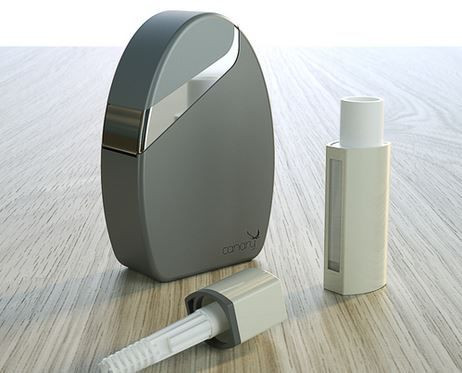Gluten Gadget, Canary, Keeps Celiac Sufferers Safe By Detecting Gluten In Food

Technology is finally catching up with the gluten-free dieters and those who suffer from celiac disease. A new device, called the Canary, is being developed by a San Francisco-based company and is scheduled to hit the market sometime next year for less than $150. The portable handheld device by 6SensorLabs will allow users to determine if the food they’re about to eat contains any gluten in it, whether intentionally, unintentionally, or through cross-contamination.
Celiac is an autoimmune disease, making the body completely intolerant of gluten, which is a protein that resides in wheat, rye, and barley. The immune system responds to the gluten protein by attacking the small intestine, damaging the small fingerlike villi that line the walls and typically help the body absorb nutrients. When the villi are damaged, nutrients can’t be properly absorbed into the body. Those with the genes are predisposed to the disease, which affects one in 100 people throughout the world and 2.5 million in the United States alone, according to the Celiac Disease Foundation.
A person’s sensitivity to gluten can range greatly. While some are able to have small increments of gluten without feeling sick, others may merely brush their arm on a countertop with crumbs from a gluten-containing bagel and will break out with hives and rashes. The Canary would serve the latter well because if celiac disease is left untreated, it could lead to serious health problems, such as type 1 diabetes, multiple sclerosis (MS), anemia, osteoporosis, infertility and miscarriage, epilepsy, and even intestinal cancers, all because of the body’s attack on the villi.
People with gluten sensitivity don’t necessarily have celiac disease but can experience symptoms of fogginess, chronic fatigue, depression, attention deficit hyperactivity disorder-like behavior, all sorts of stomach problems, along with bone or joint pain. There’s been no damage to the small intestine and no way to diagnositically test for the sensitivity. Only when a person tests negatively for celiac disease and their symptoms decrease or disappear after they’ve been put on a gluten-free diet, and symptoms reappear in full force when gluten is reintroduced into their diet, can they be certain they have it.
Companies, including 6SensorLabs, are reaping the benefits of gluten-free fad dieters. Forbes predicts gluten-free product sales will hit $15 billion by 2016, which is a 50 percent jump from 2013. Some doctors believe gluten intolerance isn’t even a real condition because it hinders no physical health aside from the self-reported symptoms. Those who do believe gluten is slowing them down, and especially those with celiac disease, will be able to benefit from the Canary, which may be a staple at restaurants to double check the dishes they’re sending out and the food family members cook at home.



























